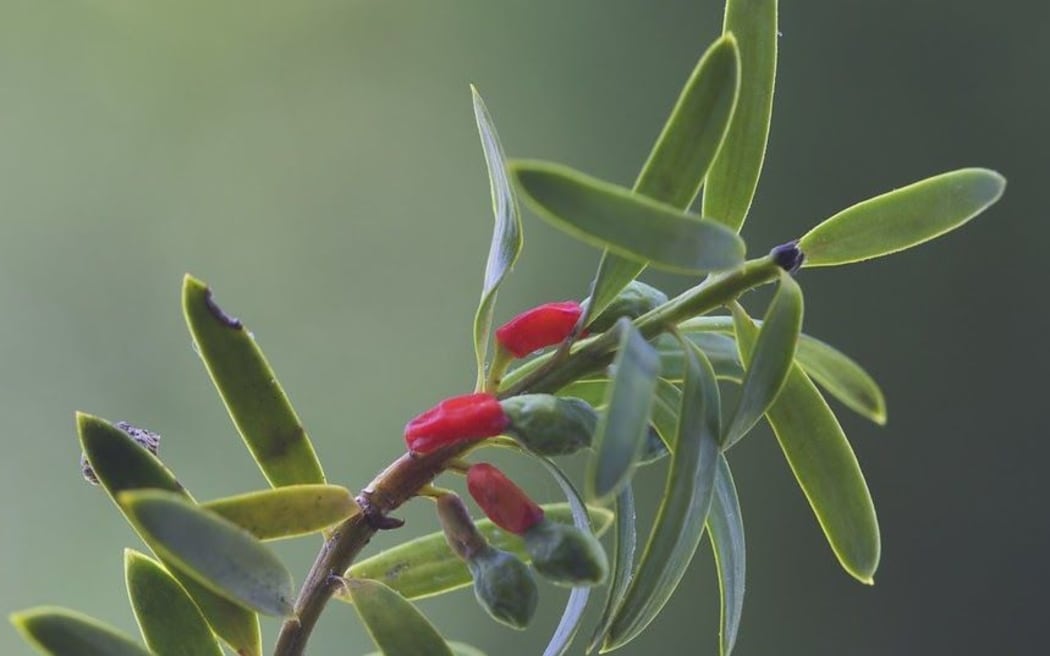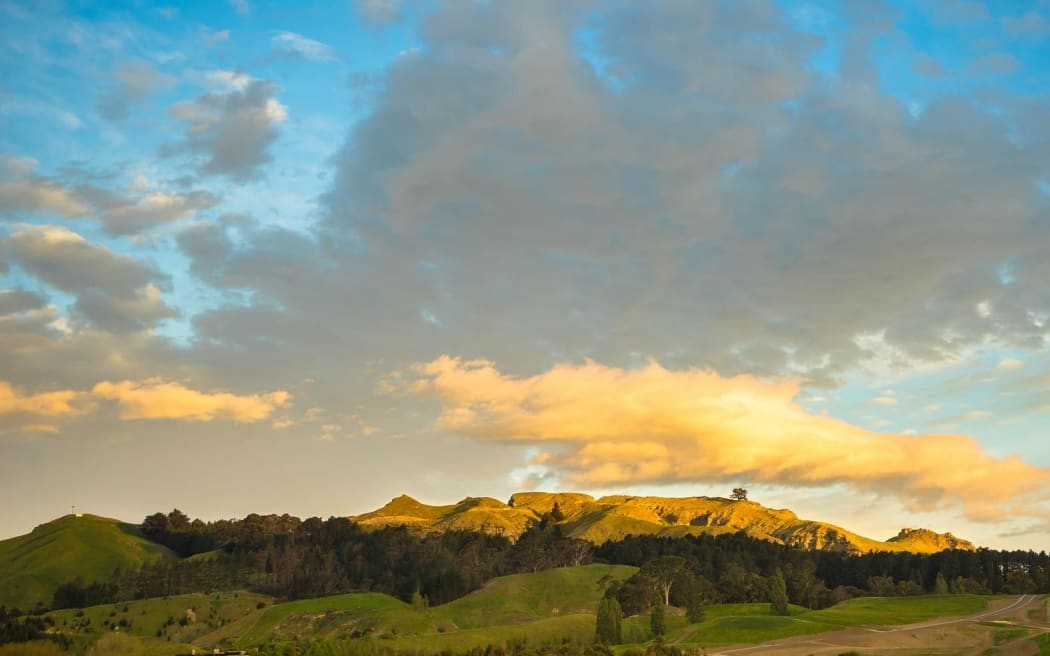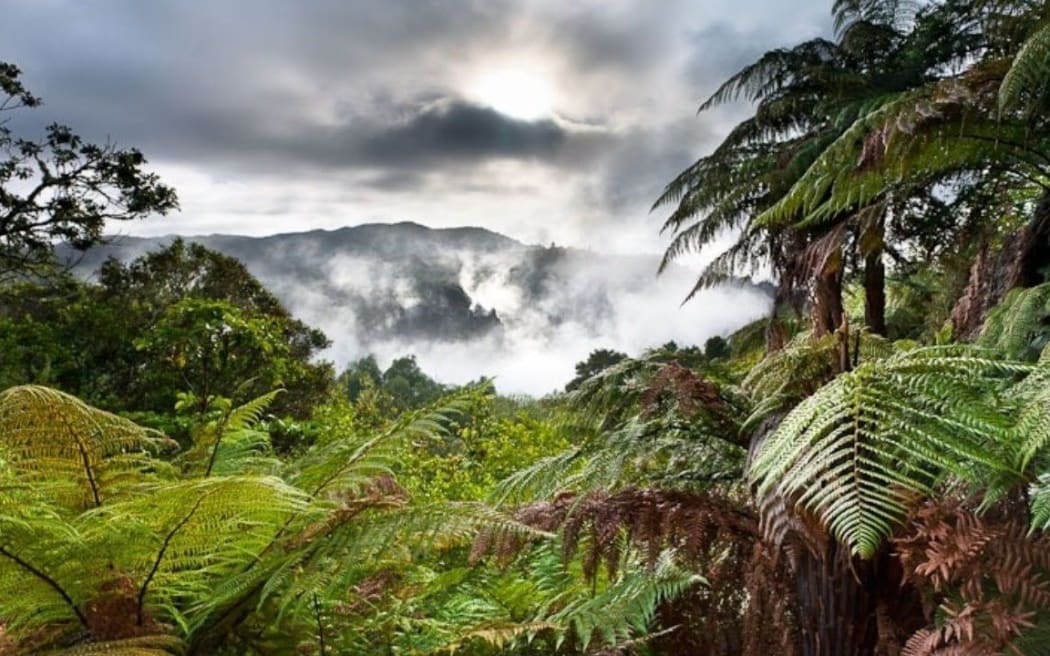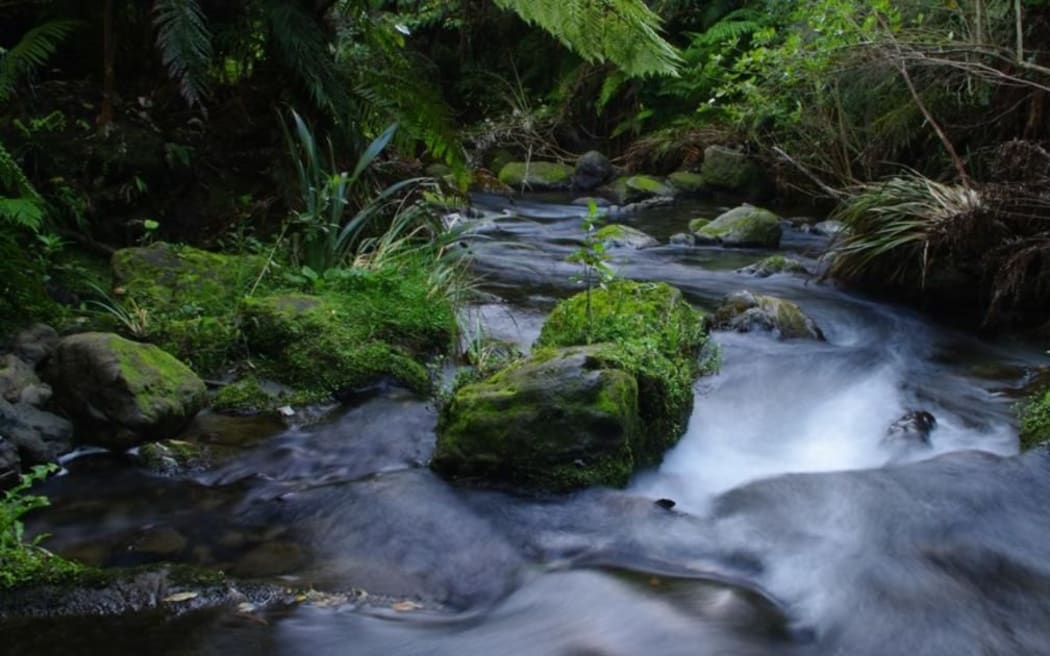
Shelley Burne-Field Photo: Supplied
A Tesla-driving city lawyer returns home to face her past in this new story by award-winning writer Shelley Burne-Field (Ngāti Mutunga, Ngāti Rārua).
Shelley regularly writes for E-Tangata and her short fiction has appeared on RNZ, Newsroom and in various anthologies. In early 2024, Shelley's middle-grade fantasy adventure novel will be published by Allen & Unwin.
* Warning - This story mentions suicide.
A Tree Full of Rubies

Photo: © Tony Foster
At 17, Pai swore she would never return to the strange, hollow town of her birth. She sobbed when she left, knowing she’d never experience the dense bush again, or feel her whenua’s heartbeat flowing inside the bellies of her favourite tōtara trees. She raged, certain she would never taste the tiny red berries that smelled of turpentine or throw her arms around the mightiest tōtara of them all, his ancient trunk as wide as a water tank. Nan had called him a tree full of rubies, a taonga who sang the song of the inland sea blood, where each note was a jewel and a salve.
So much for the oath of a dumb teenager. Pai snorted out loud and shifted in the leather driver’s seat. She was taking her first long trip south in 30 years, in the Tesla, feeling disgustingly predictable. Flouncing back in the flash new car to open the flash, upgraded netball courts.
Why did she have to be a god-damned lawyer for the netball association? Meh. Just getting herself into the car that morning had set off a phantom cramp in her Achilles heel, almost bad enough to kibosh the whole ridiculous idea. But Nan had pinched her earlobe from beyond the grave, and Pai had driven south to Taupō, regretting her decision and suddenly fighting a strong urge to turn the car around. Immediately, she felt another tug on her earlobe.
"Nan," she whispered. "Quit the pinching. I don’t want to go back to that shit hole."
Nan’s spirit didn’t care and pinched away while Pai distracted herself. She began imagining her small-town cousins, drinking handles at the Lion Bar with their pākehā mates, every eye thick with black liner. Pai couldn’t believe she was actually doing it. Actually going back to the boondocks. Back… there. Whenever she spoke of her birthplace to her city friends, she did so with a decent tic at the neck.
Pai drove the main trunk line, cutting through the middle of the island, veering off to the east, leaving the well-worn tourist track to cross the range to Te Matau-a-Māui. Hawke’s Bay: a ruffle of coastline too remote to lure busloads of German and Kōrean tourists, yet boutique enough to pull a cruise ship full of Poms or Yanks or Zimmers into a welcoming Napier Port.
Panic gripped her fingers and she spun the Tesla in a nice loop, screeching to a halt at the side of the road. Christ. Jesus, Mary and Joseph. She slammed her palms on the steering wheel. The memories of her childhood had started to flood already. She rocked back and forth.
"Aunty Pai, please come," Ana had asked on a video call. "We got rid of the fences, my Aunty. Like Nan wanted."
Pai’s favourite niece, Ana, head girl and captain of the netball A team. Ana ātaahua, fluent in Te Reo and as popular with the Hapū as she was with the Country Women’s Institute. Talented, incredible, going places, Ana. She’d invited Pai to be guest of honour at the opening of the upgraded netball courts. Yay. The thought froze every cell in Pai’s body.
The fences. Those bloody fences around those bloody courts. Pai’s right temple pinched and she massaged it as she contemplated driving again. Eventually, the Tesla eased along the highway on a cushion of air. The vehicle’s lacquer had kept its virginal state, no stone chips, no grime stuck on wheel rims, no laughing ghosts in the back.
As the paddocks passed by, Pai bent slightly to reach for the jar of smoker lollies beside the passenger seat. The pink drops reminded her of Nan who’d sucked on the aniseed treats to pretend she’d stopped smoking back in the day. Pai remembered at eight years old walking to the dairy with $1.50 to buy Nan a packet of Topaz purple cigarettes, and also a packet of smoker lollies. At thirteen years old, Pai ran more responsible errands for Nan. She and her cousin, Sharni, helped pour cups of tea at community meetings as Nan fought her battles.
"Why can’t rangatahi use those courts whenever they want to?" Nan asked at the meeting, standing in front of her chair. "Didn’t we play at the park when we were kids? Jim? The skating rink? The old basketball hoop? We played there for hours. No bloody fences and locks. Who made that stink decision? You, Pru? Who you trying to keep out?"
Nan had sat back down and dabbed her lips with a hanky she held just so. Pai had always thought Nan possessed the power of a thousand tīpuna in her little finger.
"Now, Nancy," said Jim, sitting behind the trestle table. "We’ll get back to you about the fences, alright?"
Pai drove the sea view, past the Art Deco Soundshell, under the shade of Norfolk Pines that stood at attention along Marine Parade, past whitebaiters waving their gauze nets along the Clive River, and further towards the feet of the reclining body of the Sleeping Giant, Te Mata Peak, then through hills and peaks, until she found the two bridges back home.

Te Mata Peak, Hawke's Bay Photo: Matt Dwen
The car glided across bridge number two, the wheels jive-talking over raised cracks in the bitumen. Glancing right, Pai took in the vista of the Ruahine ranges that rose in the distance. She’d arrived and felt as though she were crossing a veil stretched as tight as plastic wrap over a bake-sale cake.
Already she felt different. Arms heavier, chin blunted. Her foot slipped from the accelerator and the car rolled through an avenue of fir trees capturing strips of shadows and light that pulsed over the dashboard.
"Forget this," she hissed, and almost U-turned in front of a sheep truck. "Shit!" she screamed and stopped once again on the side of the road, panting. She caught her breath, staring up at the tall triangular trees. The lower branches skirted out, wide enough to catch a gust from the car as she pulled out and passed underneath. Pai imagined the trees lifting up and twirling into the air like heavy ballerinas, their tutu leaves fluttering in alarm. She’s back. She’s back.
Pai’s knees felt like they were being prised apart. Everywhere she looked. Everywhere. Everywhere. Stands of memories, but more; a spoor of exotic trees had been sown into the map of the town. Pai hadn’t noticed it growing up, but now she couldn’t see anything else.
Foreign trees had crept in and pushed out, cementing key location points - especially the entrances into the town. They grew dense and filled public spaces. Lined roads. Bounded titles. They also became death markers. Pai sucked in her breath. She would see the oak tree soon enough. Sharni had hung herself from that oak tree. Sharni. Her cousin. Her best friend.
This sudden awareness was captured by Pai’s small scream into the windscreen and her burgeoning realisation of being smothered. This place had become so crowded it felt as empty as a hole in the ground. She gripped the steering wheel again and felt herself breaking, tears pouring down as the car crept through town at a snail’s pace.
There were no tōtara trees here to wrap her arms around. Instead, invasive roots gripped the substrate; oak, pine, macrocarpa and lusitanica, skippy eucalypts, Himalayan cedar, black wattle acacia, popular poplar, the Japanese larch she and Sharni had spewed under after the dance. Pai couldn’t stand it and floored the accelerator, heading south.
Heading out of town, she felt lighter. On the drive to the tōtara glade, the landscape rose up, familiar, calming and unchanged. If you scraped the surrounding hills, the earth below would reveal a layer of dense black soil then layers of crushed seashells and fossilised ocean life, a hidden history pulled up from the bottom of an epoch long past: antediluvian and certainly circa Māui’s great catch.
Every stop-bank running parallel to the river was topped with this limestone. Walking and cycling tracks flowed east to west, painstakingly rolled and maintained by zipped-up blow-ins who could sever a rangatahi’s smile with a crisp racist comment, timed better than any teacher could ever hope to achieve. Just ask Sharni, her skin so dark, the town had never allowed her to shine.
When they were little, Nan insisted on the cousins coming with her to walk the foxies, Snowball and Clover. Three days a week at dawn, Pai and Sharni would skip way out in front of Nan, before the sweaty ‘hot boxes’ came riding close and ringing their ding dongs. Both kuri were dead now, buried under the koromiko, but back then Nan would moan on their behalf about the entire walking experience, and rightly so.
"I wish those Pākehās would start using dog poop bags. Don’t they know I can see them looking around like they’re going to steal something? As if I can’t see those big shits right there? Then they just bloody walk off! And those bloody cyclists with their sweaty hot boxes creep up and ring their bloody bells and Snowball runs howling down the track!"
Pai vowed to take Nan and Sharni some flowers. Drive to the urupā, but first, a walk in the reserve. In the passenger seat rolled a competition netball, signed by all the Silver Ferns. Pai couldn’t come back empty-handed, now could she? She was the successful one. The rich lawyer. She steadied the ball from falling off the seat. Nan would’ve been so proud. Her moko, Pai, leading the legal team for netball royalty. Her moko nui, Ana, on the way to becoming netball royalty. Pai still felt stink. She wanted to get out of there so badly her chest ached.
The Tesla tyres crunched onto the stones at the reserve car park and came to rest. Another memory flashed into her mind’s eye. Nan would find the ripest tōtara berries just for her and Sharni. The ones from saplings that popped in your mouth, tasting fruity with a hint of podocarp. The reserve had been their sanctuary. Nan would drive the twenty minutes just to get her mokos away from town.

Photo: YouTube screenshot
Already, Pai smelled leaf litter and honeysuckle and the mountain air on the breeze. A path led through the first stand of bush and past a new long-drop which greeted her at the entrance. Somebody had planted mānuka and harakeke. The old, perfect tītoki had grown huge too, its branches spread up and out like a huge emerald umbrella. A lunch table sat at its base, while a pirita vine wound through its lower limbs. Pai entered the main bush and breathed deeply.
She wore sneakers and a fashionable cream tracksuit but she didn’t run, savouring the shade and the mossy smells. Dots of sunlight twinkled under the canopy as though she were beneath the sea. After some unfamiliar twists and turns, she thought that the tōtara tree should be just around the next corner, yet when she tripped over a knotted root that looked like two coiled snakes, she tipped forward and stumbled into the middle of a dazzling patch of sunlight.
When her eyes adjusted, Pai shook her head, confused. She was still on her feet, but everything was upside down. The tōtara tree, no longer towering, was laying on the ground in chunks, like the neck of diplodocus, pieces of vertebrae disappearing through a corridor of crushed bush. Pai’s hand shot up to cover her mouth. Her heart stuttered and she froze in the middle of the track.
"No. No. No."
It was a tohu, a sign. He had fallen, blown over in a cyclone? Toppled from sheer exhaustion? The foot of the roots was still caked in dirt in the shape of a huge starfish, sucking at the air. Pai rested her fingertips on part of the tōtara trunk, slowly trailing them along its length. She fell forward, kneeling, resting her forehead against the wood. There were no red berries. Not one.
Eventually, she wiped the tears and snot from her lips, then sat back against the wood. She needed Nan and even as she thought it she felt a caress on her earlobe, then a touch on her upper arm as though Nan’s big knuckles had poked her awake.
"Get up girl, a kōtiro needs you."
Get up. Ana needs you. But Pai’s thighs were ice. She couldn’t feel her sitting bones. She didn’t want to get up. She didn’t want to admit that he hadn’t had the strength to stand. She didn’t want to admit that she’d abandoned him for so long. Part of the fallen trunk had been cut up into chunks by a chainsaw. She wondered who had done that? Who held those precious pieces of him?
She wanted to sink into the moss and dirt and red sawdust and give up, not get up. Her head fell back and the sunlight glowed through her eyelids. She stayed like that for a long time, listening to the bird whistles, the hum of the bush, the crawl of beetles, the trembling rush of leaves. She sat and rubbed dirt between her fingers. She thought of Sharni’s swinging body. She thought of Nan’s little finger. She thought of Ana.
A stream trickled nearby, the sound like raindrops. The water smelled sweet and fresh. How could a place still be peaceful, after this?

Photo: 100% Pure New Zealand
Pai brushed the twigs off her tracksuit and ran back to the car. Her body strained to get away from the nightmare. Forget it. She made up her mind to leave. Something prodded Pai in the middle of her shoulder blades, then again, yet when she turned around, nothing was there. "Stop it, Nan, you don’t even bloody know."
How could Pai stand in front of all those people at the netball courts in an hour and be so plastic? This place had killed everything she had ever loved! Pai had never told Nan about what happened that night after the meeting, all those years ago. Nan had moved around the committee room, laughing and clinking cups of tea. Pai and Sharni had served cup after cup, feeling unseen behind the table - two thirteen-year-old nobodies. Old Jim and wrinkled Pru didn’t even make an effort to whisper.
"You’re not really considering her request?" asked Pru, slurping. "We can’t let those people wreck the courts."
"Don’t worry," said Jim. "The fences are being built next week. But I didn’t tell her that."
They’d lied. Straight to Nan’s face. Lied with no stomach roll. Lied with no thought of recourse or redress. Lied without an eyelid flutter. Lied with the confidence that it would never be questioned - especially not by two little brown girls serving tea. But then, Sharni had spoken up.
"I think fences create a barrier for rangatahi who want to practice shots after school," Sharni said proudly while Pai stared at her beautiful lips. It was like Sharni had taken a soft whip and cracked it in Pru’s pale old face.
"She’s from that family, isn’t she?" Pru purred to Jim as if Sharni wasn’t even there. Then Jim nodded and Pru smiled with straight teeth.
"Don’t you live in that little run-down house on the main road?" she asked Sharni. "The one that’s due to be condemned?"
Pai remembered Sharni’s face freezing up. She looked confused and embarrassed, and she’d turned away. Pai never told Nan. The fences around the courts were built the very next week.
"One day, they’ll have to balance their ledger along with everyone else," Nan had said when she’d seen the fences go up.
Driving back to the main highway, a dribble of tears released from the corners of Pai’s eyes and she swiped them away. When she reached the intersection, she sat in the Tesla while other cars drove around her, tooting. She could escape. Make up an excuse. A burst water pipe in Auckland? Then the jar of smoker lollies fell, scattering pink drops all over the mat at her feet.
Fine, Nan, thought Pai. Just one look, and then I’m gone.
When Pai pulled up at the netball courts, an hour early, she wound the window down and gasped. The hanging oak tree was completely gone, not even a stump left. The wire-link fence and metal poles were erased too, replaced by rows of newly planted saplings. Rimu and mātai and tōtara, with corner gardens of mānuka and ake ake and harakeke. At least a dozen carved tōtara pou guarded the area, planted in the ground like sentinels, welcoming any rangatahi who wanted to come and practice their shots.
She stepped out of the car, trembling, carrying the netball under one arm. She ran her fingers over each wooden pou, tracing the swirls, curves, and notches. She held her ear to the wood and heard the singing of the inland sea blood. The carvings held the stories of this place, of tīpuna and atua, once hidden, now revealed. Then she spied it. A tōtara sapling with a cluster of rubies on the tip of a spiky branch. In a flash, the taste of berries and a hint of turpentine popped on her tongue.
Another carving stood out, a sign made of his flesh, where raised letters formed into two names she recognised. To Nan. To Sharni. A dedication. She felt a wonderful tug on her earlobe, and a sob escaped her lips.
The netball fell from her grip and bounced along the court before somebody behind her picked it up. Pai turned to see Ana and two of her friends. Such beautiful young wāhine, confident, real and strong. Born here, in this place, but different to Pai, somehow. Wiser. More able to shine. More able to love. They gathered around, wiping their eyes, so tender and silent as Pai’s knees buckled and Ana wrapped her in a warm embrace.
"Nau mai, haere mai, my Aunty. We got you."
Where to get help:
Need to Talk? Free call or text 1737 any time to speak to a trained counsellor, for any reason.
Lifeline: 0800 543 354 or text HELP to 4357
Suicide Crisis Helpline: 0508 828 865 / 0508 TAUTOKO (24/7). This is a service for people who may be thinking about suicide, or those who are concerned about family or friends.
Depression Helpline: 0800 111 757 (24/7) or text 4202
Samaritans: 0800 726 666 (24/7)
Youthline: 0800 376 633 (24/7) or free text 234 (8am-12am), or email talk@youthline.co.nz
What's Up: free counselling for 5 to 19 years old, online chat 11am-10.30pm 7days/week or free phone 0800 WHATSUP / 0800 9428 787 11am-11pm Asian Family Services: 0800 862 342 Monday to Friday 9am to 8pm or text 832 Monday to Friday 9am - 5pm. Languages spoken: Mandarin, Cantonese, Korean, Vietnamese, Thai, Japanese, Hindi, Gujarati, Marathi and English.
Rural Support Trust Helpline: 0800 787 254
Healthline: 0800 611 116
Rainbow Youth: (09) 376 4155
OUTLine: 0800 688 5463 (6pm-9pm)
Help with alcohol and drugs
Alcohol Drug Helpline: 0800 787 797
If it is an emergency and you feel like you or someone else is at risk, call 111.

